President Position Profile
The Opportunity
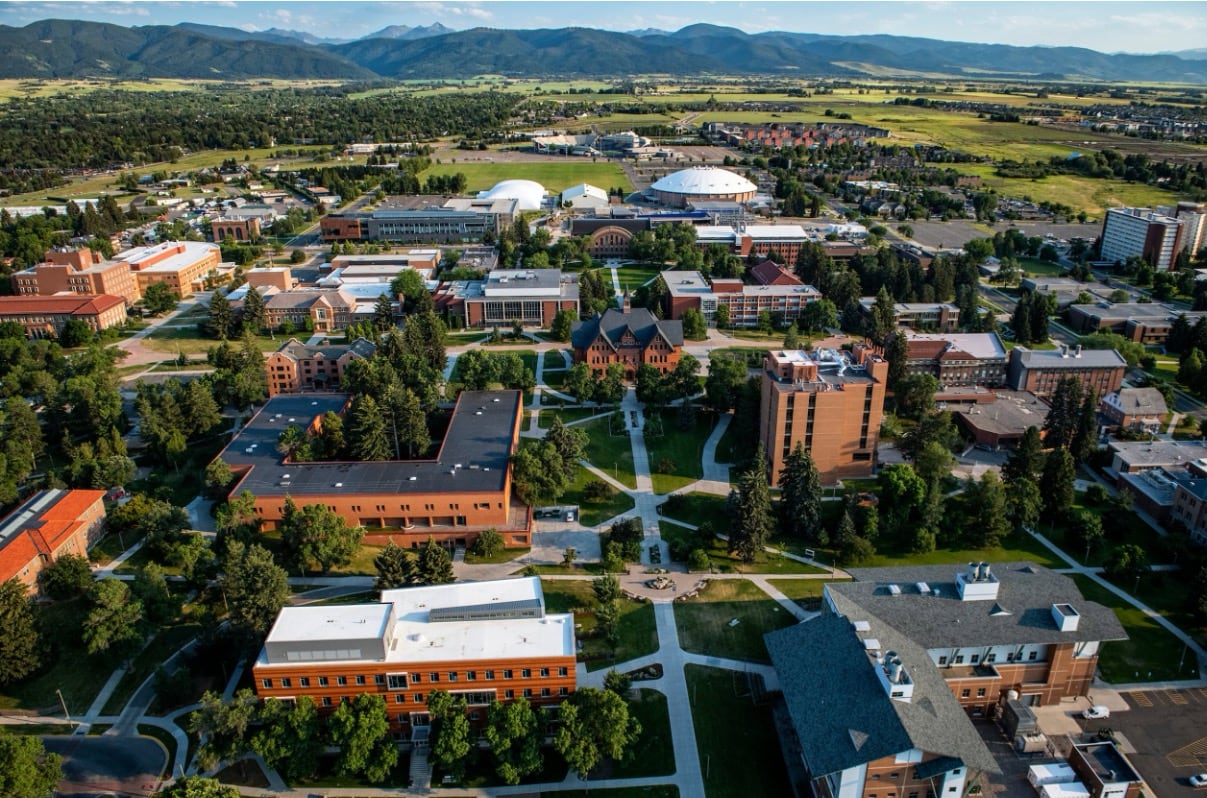
Montana State University (MSU) is seeking applications and nominations for the position of President. This is a historic opportunity to serve as the 13th President of MSU, with the opportunity to build upon the significant legacy of President Waded Cruzado. MSU is renowned for its excellence in research, education, and community engagement. The new president will play a critical role in advancing MSU's mission of fostering innovation, supporting student success, and strengthening its impact on the state of Montana and beyond. This selection process reflects MSU's commitment to finding a candidate who embodies its values and who can inspire its diverse community to achieve even greater heights.
The President of Montana State University is the Chief Executive Officer of this Carnegie top-tier research land-grant institution, with record-setting enrollment, retention and philanthropic giving. This position reports directly to the Commissioner of Higher Education who is the Chief Executive Officer of the Montana University System (MUS). Within this structure the president will play a pivotal role in shaping the future of MSU and its affiliates, by providing visionary leadership, ensuring academic excellence, managing financial resources effectively, engaging with stakeholders, and fostering an inclusive campus environment.
Key Responsibilities
- Leadership and Vision: Provide strategic leadership that positions MSU as a leader in student success, academic excellence, research innovation, and community engagement. Set the vision for the future of MSU in alignment with its role as a land-grant university.
- Commitment to Student Success: Engaged commitment to all students with a focus on access, achievement, retention, and success, making Montana State University the school of choice.
- Academic Excellence: Promote a culture of academic rigor and student success by supporting faculty excellence in teaching, research, scholarship, and creative arts. Ensure access to high-quality education and foster academic initiatives that enhance student achievement and experience.
- Research and Innovation: Lead efforts to advance MSU’s research enterprise, increasing external research funding and scholarship, promoting interdisciplinary collaborations, increasing graduate student enrollment, and enhancing MSU’s reputation as a national leader in research.
- Community Engagement and Outreach: Uphold the land-grant mission of MSU by fostering partnerships with local, regional, and national communities. Lead efforts to address Montana’s most pressing challenges through research, extension, and outreach.
- Fundraising and Development: Cultivate relationships with alumni, donors, and external stakeholders to enhance fundraising efforts. Secure resources to support academic, research, and infrastructure development at MSU. Must have knowledge of strategic diversification of revenue sources and creative allocation and resource generation, including fundraising and fostering industry support.
- Inclusion and Accessibility: Champion inclusion and accessibility initiatives on campus. Develop policies and practices that promote an inclusive environment for students, faculty, and staff of all backgrounds.
- Operational and Financial Management: Oversee the university’s budget, resources, and infrastructure. Ensure fiscal responsibility, transparency, and the effective allocation of resources in alignment with the university’s strategic priorities.
- Compliance: Responsible for ensuring that the university complies with all applicable local, state, and federal regulations, as well as institutional policies and accreditation standards, fostering a culture of accountability and ethical conduct across all academic and administrative functions.
- Collaboration: Collaborate effectively with external stakeholders, state and federal officials, and others to promote the interests of higher education in Montana. Foster a culture of partnership and mutual support among university leadership, faculty, staff, and students across all institutions.
- Governance: The president is vested with the responsibility of administering Board of Regents policies under the supervision of the Commissioner of Higher Education.
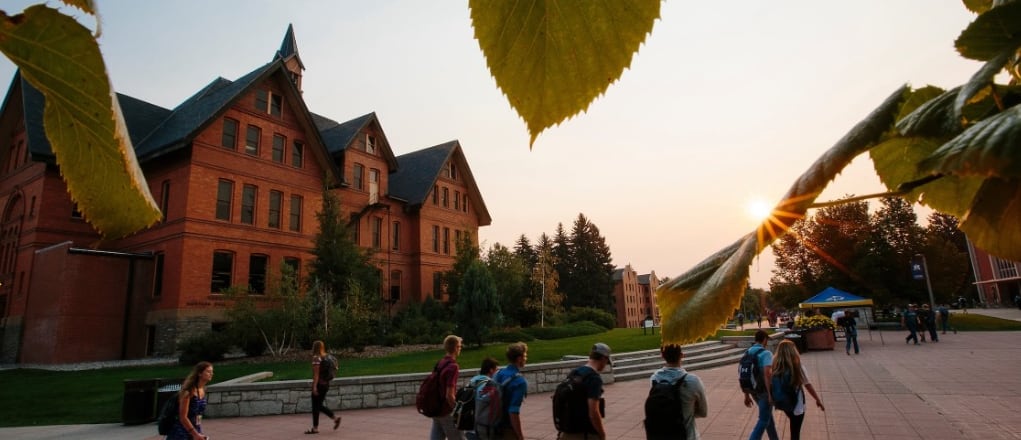
Qualifications
The successful candidate will possess the following important qualifications:
- Educational credentials, experience, and a record of professional accomplishments commensurate with the position of President of a top-tier doctoral research university. A successful candidate would have a distinguished record of academic achievement and scholarship at a degree-granting university or college or senior leadership experience in a business, corporate environment, public sector, or nonprofit.
- Proven success in managing large, complex organizations, with experience in strategic planning, financial oversight, and resource development.
- A demonstrated commitment to student success, faculty and staff development, and academic excellence.
- The ability to advance MSU’s research agenda and foster innovation across disciplines.
- Strong interpersonal and communication skills with the ability to engage effectively with diverse internal and external stakeholders.
- A deep commitment to and demonstrated leadership in fostering an inclusive and accessible academic community.
- Proven experience cultivating donor/client relationships and raising funds to support institutional priorities.
- Must be a U.S. citizen able to acquire “Top Secret” security clearance level post hire.
Characteristics
The successful candidate will demonstrate the following characteristics:
- The ability to thrive in a state university system led by a governing Board of Regents and Commissioner of Higher Education and the ability to advocate for MSU, collaborate with other leaders in the university system, and respect and embrace the great history of the university.
- Sound strategic planning and clear decision-making based on regional, national, and global trends in higher education.
- A proven leader in scholarship and academics with a distinguished record, unquestionable integrity, a demonstrated commitment to student success and engagement, and a strong sense of pride in the land-grant mission.
- A strong commitment to the humanities and the ability to advocate for its critical role in the university.
- A proactive commitment to student-first, student-centered learning and student support.
- Significant senior level administrative and management experience in an organization in leading, developing, and building consensus in a complex and competitive environment.
- Experience leading and implementing initiatives among students, faculty, and staff using an approach that promotes shared governance and transparent decision-making.
- Championing the university with all stakeholders, including the state legislature, tribal leaders, business community leaders, industry partners, foundations, K-12, the statewide higher education sector, and the state's residents.
- An exemplary work ethic, authenticity, and integrity.
- Value and support intercollegiate athletics, student-athletes, and athletic department operations.
- Experience engaging and growing an active university alumni association.
- Engaging and growing fundraising activities to advance the university’s strategic priorities.
About Montana State University
Montana State University
Founded in 1893, four years after Montana became the 41st state, Montana State University was designated as the land-grant university of the state. As Montana’s land-grant, the original mission of MSU, as set forth in the Morrill Act of 1862, was to teach agriculture, military tactics, and the mechanical arts (now known as engineering) as well as classical studies so that members of the working classes could obtain a liberal, practical education. The tradition of providing a high-quality, affordable higher education to all who have the desire continues to run deep.
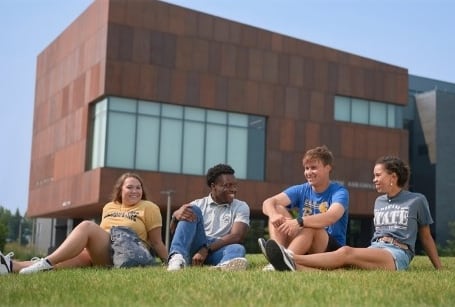
MSU is home to a diverse student body of more than 17,000.
Montana State University is now a Carnegie-designated doctoral university with very high research activity (R1) and a community engaged flagship, land-grant institution. MSU offers more than 250 baccalaureate, graduate certificates, master’s, and doctoral degree programs. The university’s annual budget exceeds $900 million, with more than 900 faculty, 2,000 staff members, and more than 17,000 students who represent all 50 states and 72 countries.
In addition to the Bozeman campus, Montana State University has an embedded two-year program, Gallatin College MSU, and three affiliated campuses—MSU Billings, MSU Northern in Havre and Great Falls College MSU. As Montana’s land-grant institution, MSU is an active partner in the state’s educational and economic development agenda; its seven research centers under the Montana Agricultural Experiment Station, 55 MSU Extension offices, the Fire Services Training School, five nursing campuses and public service programs reach every county of the state, as well as seven tribal reservations.
Montana State University has a varied research portfolio. Research expenditures reached a record $257.9 million in fiscal year 2024, with major areas of research excellence in agriculture, biotechnology and health care, economics, education, mental health, nanotechnology, optics and photonics, quantum physics, and national security (including a classified research facility).
In addition to graduate research and education, Montana State University offers a strong focus on undergraduate student research, which in recent years has resulted in unprecedented numbers of national and international awards, including Rhodes, Gates, Truman, and Newman scholars; nationally, the institution ranks ninth in the nation in terms of Goldwater Scholars. MSU’s steadfast commitment to the land grant-mission has strengthened its leadership through transformational programs that provide advancement opportunities to all students from Montana, every state in the U.S. and six continents.
Mission
Quick Facts
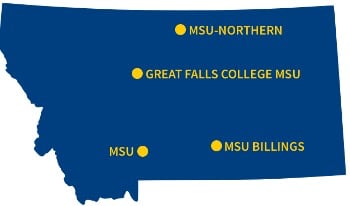
- MSU – Billings
- MSU – Northern
- MSU – Great Falls College
- Gallatin College MSU
- Ranked among top 5% universities in the world (Center for World University Rankings)
- Total Enrollment: 17,144 students
- Residents/Nonresidents: 49% Residents; 51% Nonresidents
- Largest research entity in Montana: $257.9M in annual research expenditures (2024)
- Undergraduate Programs: 250+
- Graduate Programs: 115+
- Job-focused programs: 22+ (Gallatin College MSU)
As the state’s land-grant university, Montana State integrates education, creation of knowledge and art and service to communities.
Vision
Montana State University will transform lives and communities in the people’s interest.
Values
- Excellence: We pursue exceptional outcomes.
- Integrity: We commit to honesty, ethical behavior and accountability.
- Inclusion: We create a civil, supportive and respectful environment where difference and diversity are sources of strength.
- Collaboration: We believe that working together produces better outcomes.
- Curiosity: We expect inquiry, exploration, creativity and innovation.
- Stewardship: We care for and conserve the human, economic, physical and environmental resources entrusted to us.
Strategic Plan
Montana State University’s strategic plan, Choosing Promise, sets overarching goals for the university and relies on every member of the MSU community – students, faculty, staff, alumni and our community partners – to contribute to its success. The plan is intended to guide and inform those making strategic decisions, without constraining the tactics that will help MSU achieve its goals. Each university unit is empowered to envision its future, develop its own paths to these goals and contribute to the university’s success in diverse and creative ways.
For additional information about MSU’s Strategic Plan, please visit: Montana State University's Strategic Plan: Choosing Promise
Montana State University Bozeman
As the land-grant institution of the Montana University System and the largest university in the state, MSU Bozeman is dedicated to providing a world-class education, conducting cutting-edge research, and fostering community engagement. With a commitment to academic excellence, innovation, and sustainable development, MSU plays a central role in shaping the future of Montana.
MSU offers over 250 undergraduate and graduate degree programs across a wide range of disciplines, including engineering, agriculture, health sciences, business, education, the arts and humanities, and the natural and social sciences. The university is known for its strengths in science, technology, engineering, and mathematics (STEM), and its emphasis on research that addresses real-world challenges in fields like agriculture, climate science, renewable energy, and biotechnology.
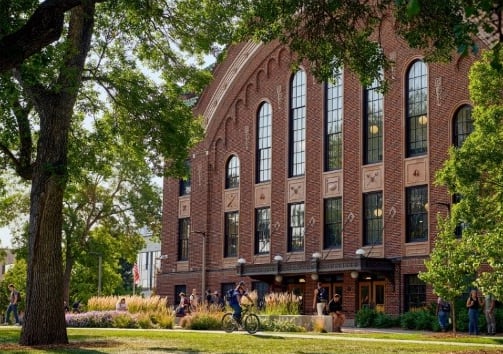
Romney Hall at Montana State University
The university is particularly renowned for its research and innovation, with faculty and students actively engaged in research that not only advances academic knowledge but also benefits industry, government, and society. MSU ranks among the top universities in the nation for research and development funding, particularly in areas related to agriculture, engineering, and environmental sciences. The university is home to numerous research centers and institutes, including the MonArk Quantum Foundry, the Optical Technology Center, the Western Transportation Institute, the Montana Space Grant Consortium, the Ivan Doig Center for the Study of the Lands and Peoples of the North American West, and the Center for Biofilm Engineering which contribute significantly to the regional and global economy.
MSU's commitment to student success is evident in its personalized approach to education, small class sizes, and strong academic advising and support services. The university offers a vibrant student life, with a wide range of extracurricular activities, from student organizations and leadership opportunities to outdoor recreation in the surrounding Rocky Mountains. MSU also places a strong emphasis on experiential learning, offering students opportunities for internships, co-ops, research projects, and service learning to gain practical skills and hands-on experience.
Located in Bozeman, a rapidly growing city known for its high quality of life, MSU provides students access to a dynamic community that values education, entrepreneurship, and outdoor recreation. The university’s ties to local industries, government agencies, and nonprofit organizations offer students valuable networking opportunities and connections to potential employers.
Academics
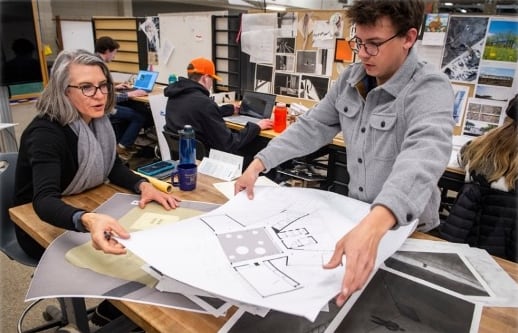
Architecture faculty work with MSU students.
Montana State University is dedicated to providing a high-quality education across a wide array of disciplines. MSU is known for its strong academic programs, innovative research, and commitment to student success. As a land-grant university, MSU strives to provide accessible, world-class education that addresses the needs of the state, the region, and global communities.
Key features of Montana State University's academic offerings include:
- Diverse Academic Programs: MSU offers a wide range of undergraduate, graduate, and professional programs across eight colleges and schools, including the College of Agriculture; College of Arts & Architecture; Norm Asbjornson College of Engineering; College of Education, Health & Human Development; College of Letters & Science; Mark and Robyn Jones College of Nursing; Jake Jabs College of Business and Entrepreneurship, and the Graduate School. MSU provides a comprehensive academic environment that supports both specialized fields and interdisciplinary studies.
- Land-Grant Mission & Community Impact: As a land-grant institution, MSU is deeply committed to improving the lives of Montanans and beyond. The university excels in agricultural research, extension services, and community outreach. It provides practical, hands-on learning experiences for students and actively engages in projects that address local and global challenges.
- Research & Innovation: MSU is recognized for its research excellence, particularly in areas such as engineering, biotechnology, photonics, physics, agriculture, health sciences, sustainable energy, and environmental studies. The university’s research enterprise is growing rapidly, with MSU faculty and researchers securing millions in external funding to support innovative projects. The MSU Office of Research and Economic Development provides leadership and resources to foster collaboration between faculty, students, and external partners to translate research into tangible solutions.
- Experiential Learning & Hands-On Opportunities: MSU emphasizes experiential learning, offering students numerous opportunities to apply classroom knowledge in real-world settings. These include internships, co-ops, field studies, research projects, and study-abroad programs. MSU’s connection to the state’s industries, including agriculture, natural resources, and technology, allows students to gain direct experience in fields relevant to their careers.
- Faculty Excellence & Student Support: MSU prides itself on having a faculty who are not only leading experts in their fields but are also dedicated to teaching and mentoring students. With a student-to-faculty ratio of 18:1, MSU offers personalized attention and opportunities for close faculty-student interaction. The university offers a range of academic support services, including tutoring, advising, career counseling, and a robust library system to ensure students have the resources they need to succeed academically.
- Commitment to Student Success: MSU is committed to helping students succeed both academically and personally. The university provides a range of services to support students’ well-being, including mental health resources, extracurricular activities, leadership programs, and access to research and career opportunities. MSU’s focus on student success extends beyond graduation, with programs designed to help students transition from academia into the workforce.
- Global Perspective: While MSU maintains its strong ties to the state of Montana, the university includes students and faculty from across the U.S. and around the world. The university offers study abroad programs and engages in international partnerships that provide students with global learning experiences and the ability to work on international research initiatives.
- Strong Industry and Community Partnerships: MSU collaborates closely with industry partners, government agencies, and community organizations to ensure that its academic programs are responsive to current needs and future challenges. Partnerships with local businesses, agriculture organizations, and national laboratories provide students with access to internships, research opportunities, and real-world applications of their studies.
- Focus on Sustainability: MSU places a high priority on sustainability and environmental stewardship across its academic programs. The university is actively involved in addressing issues like renewable energy, sustainability, and conservation. Many academic programs, particularly in engineering, environmental science, and agriculture, emphasize sustainable practices and solutions.
- Graduate Education and Research Opportunities: MSU’s graduate programs are designed to cultivate advanced knowledge, research, and professional expertise. With a strong emphasis on interdisciplinary research, students in MSU’s Graduate School have access to state-of-the-art facilities, a vibrant academic community, and opportunities to collaborate with faculty on groundbreaking projects.
Affiliate Campuses
MSU Billings
Nestled below the rimrocks that overlook Montana’s largest city, Montana State University Billings delivers a transformative education, whether it’s for a traditional college student exploring their future, an adult learner looking to take the next step in their career, or someone needing to upskill or retool.
As a public university, MSUB offers affordable tuition for those interested in pursuing a certificate or an associate, bachelor’s or master’s degree. MSUB offers 115 academic programs through its five colleges: the College of Liberal Arts & Social Sciences, the College of Business, the College of Education, the College of Health Professions and Science, and City College.
The Yellowjacket community is a close-knit one. Small class sizes to ensure that instructors can provide tailored resources to help students achieve their goals. The Center for Engagement connects students with organizations, events, and communities of interest, helping students network and develop peer relationships.
Students can also take their learning beyond the classroom. From service learning to internships to research opportunities, students put their education into practice and make connections that lead to rewarding careers. For additional information, visit: MSUB
MSU Northern
Located in Havre, Montana State University-Northern is north-central Montana's comprehensive university, offering programs and services at the associate, baccalaureate, and master's levels.
Degree programs range from teacher education to engineering technology, emphasizing both technology and liberal arts education. MSUN programs are in the disciplines of business, nursing, engineering and mechanical technology, teacher education, natural sciences, and humanities. Applied research and service functions are aligned with many of the university's disciplines and respond directly to the region's economic and societal needs.
Specializing in serving a large geographic region, MSUN serves an area that includes four Native American reservations. The university functions as an important cultural resource and continuing education center. For additional information, visit: MSUN
Great Falls College MSU
Great Falls College Montana State University is a public two-year college located in Great Falls, Montana. Offering a variety of technical, vocational, and academic programs, the college serves students seeking to earn associate degrees, certificates, and diplomas in fields such as health care, business, information technology, manufacturing, and applied sciences.
Great Falls College MSU is known for its hands-on, career-oriented education and close connections with local industries. This allows students to gain relevant skills and certifications that prepare them for the workforce or for transfer to a four-year institution within the MSU system or beyond. The college emphasizes small class sizes, personalized attention, and strong support services to help students succeed both academically and professionally.
In addition to its technical and professional programs, Great Falls College MSU also offers general education courses that can be transferred to four-year universities, giving students flexible pathways to continue their education. The college is also active in promoting community engagement and lifelong learning, offering workshops, certifications, and training programs to local residents and businesses.
Overall, Great Falls College MSU provides a quality, accessible education that supports both local and regional workforce needs while offering a strong foundation for future academic and career advancement. For additional information please visit: MSU Great Falls
Gallatin College MSU
Gallatin College Montana State University is a regional two-year college located in Bozeman, Montana, and a vital part of the university. Gallatin College MSU offers accessible, high-quality education and workforce development opportunities for students seeking to pursue associate degrees, certificates, and professional development programs in high-demand fields. The college focuses on practical, hands-on learning, preparing students for immediate entry into the workforce or transfer to four-year programs at MSU or other institutions.
Gallatin College MSU offers a range of programs in fields such as health care, business, technology, and applied sciences. These programs are designed to provide students with the knowledge, skills, and certifications required by local industries and employers. Key areas of focus include health professions (such as nursing and medical assisting), business administration, information technology, and skilled trades. Additionally, the college offers opportunities for students to complete general education requirements and transfer to four-year programs at MSU in Bozeman or other universities, providing a flexible pathway for students who wish to continue their education.
A hallmark of Gallatin College MSU is its emphasis on experiential learning, including internships, clinical placements, and project-based courses that allow students to gain real-world experience while studying. This practical approach ensures that graduates are well-equipped to enter the workforce or continue their education with confidence. The college also offers adult and continuing education programs for individuals looking to upskill, advance their careers, or transition into new fields.
Gallatin College MSU leverages its location in the growing community of Bozeman to build strong partnerships with local employers, providing students with direct connections to job opportunities and internships. The small class sizes and personalized support services ensure that students receive individualized attention and a supportive learning environment.
Overall, Gallatin College MSU plays a critical role in meeting the educational and workforce needs of the Gallatin Valley and the broader region. By offering high-quality, flexible educational options and building strong ties with local industries, the college helps students achieve their career goals and contribute to the economic development of the area. For additional information, visit: Gallatin College MSU
MSU Extension
Montana State University Extension is a statewide educational outreach service of MSU, providing research-based information and programming to individuals, families, communities, and industries across Montana. MSU Extension plays a key role in delivering the expertise, research, and resources of the land-grant university to the public, helping to address local challenges, improve quality of life, and support economic development throughout the state. Ninety-six MSU Extension agents and 26 subject matter experts serve local needs in 56 counties and seven reservations.
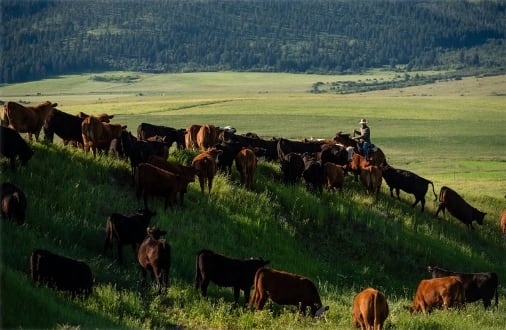
MSU staff work with cattle at Fort Ellis.
MSU Extension's mission is to enhance the well-being of Montanans by fostering knowledge, skills, and innovative solutions in areas such as agriculture, natural resources, family and consumer sciences, youth development, community vitality, and health. MSU Extension works in collaboration with local partners to identify emerging needs, then it plans and prioritizes work to support those needs. For additional information about MSU Extension, visit: MSU Extension
Montana’s Agricultural Experiment Station
The faculty and staff of Montana's Agricultural Experiment Station (MAES) conduct research and outreach programs addressing crop and animal production methods, market growth opportunities, pest management, and environmental quality issues. MAES has seven off-campus Research Centers and local campus farms that focus on production and production challenges in the diverse agro-ecosystems of the state. Collectively, MSU’s campus farms and off campus Research Centers plus faculty on the MSU-Bozeman campus constitute the Montana Agricultural Experiment Station (MAES) and the MSU College of Agriculture. MAES and the statewide Research Centers provide the foundation upon which the research and teaching missions of the university stay relevant to needs of agriculture in the state of Montana. For additional information about MAES, visit: MAES
Athletic Success
Montana State University Athletics plays a central role in fostering school spirit, community engagement, and student-athlete success at MSU. With a proud tradition of athletic achievement, MSU Athletics offers a wide range of competitive sports programs, competing in the Big Sky Conference at the NCAA Division I level, representing the university with pride, dedication, and excellence in both athletic performance and academic success.
MSU Athletics includes 15 varsity sports—8 for women and 7 for men—competing in the Big Sky Conference. These programs span a variety of sports: football, basketball, cross-country, track and field, volleyball, skiing, tennis, rodeo, and golf, providing student-athletes with the opportunity to excel in their respective sports while earning a world-class education. MSU’s athletic teams are known as the Bobcats, and the university’s mascot, Champ, embodies the spirit of hard work, resilience, and sportsmanship that defines the Bobcat community.
The university’s football program is one of the most prominent and successful in the Big Sky Conference, with multiple playoff appearances. Uniquely, it is the only college football program in the nation to win national championships on three different levels of competition: NAIA, NCAA Division II and NCAA Division I-AA (now FCS). MSU’s men’s and women’s basketball teams, as well track and field programs, have also earned recognition for their competitive excellence, producing numerous conference championships and NCAA tournament appearances. Over the last eight years, Bobcat Athletics has had their most successful run in their storied history. Some of the recent athletic successes include:
- Football: Big Sky Conference Championships in 2022 and 2024; advancing to the FCS National Championship Game in 2021; this fall, the team set a historic 11-0 record.
- Men’s Basketball: Won multiple Big Sky Conference regular season and tournament titles; Big Sky Tournament Champions in 2022, 2023, and 2024 earning bids to NCAA Tournament.
- Women’s Basketball: Consistently been a top contender in the Big Sky Conference, winning regular-season and tournament championships 5 of the last 8 years; most recently earned a spot in the NCAA Tournament in 2022.
- Track and Field/Cross-country: Regularly excel in the Big Sky Conference, producing multiple All-Americans and conference champions; has produced several individual NCAA champions in track and field events.
- Skiing: Long history of success, consistently qualifying for NCAA Championships and receiving national rankings; individual skiers have earned All-American honors.
- Rodeo: One of the most successful teams in the nation, regularly competing at the College National Finals Rodeo; has produced numerous individual national champions.
Additionally, MSU Athletics places a strong emphasis on developing student-athletes who excel not only in sports but also in the classroom, maintaining high academic standards and fostering leadership and community involvement. Bobcat student-athletes currently carry a 3.34 grade point average.
Beyond competition, MSU Athletics is committed to the holistic development of student-athletes. The department offers academic support services, career counseling, and life skills programs to help athletes succeed both during and after their time at MSU. The athletics program also emphasizes community engagement, with athletes participating in local service projects and building strong relationships with the Bozeman community.
Through its emphasis on athletic excellence, academic achievement, and community engagement, MSU Athletics contributes to the overall student experience, boosts school pride, and enhances the reputation of Montana State University. As MSU continues to grow as a leader in higher education, its athletics program remains an integral part of its identity and a vital connection to the broader Montana community. For additional information about MSU Athletics, visit: MSU Athletics.
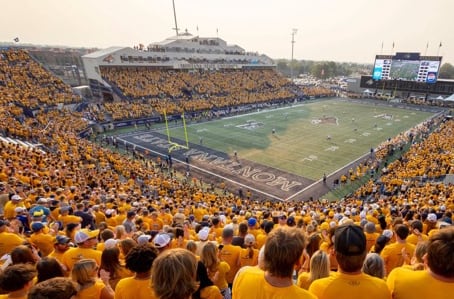
MSU's first home game of the season is traditionally known as Gold Rush.
The State of Montana
Montana is a unique combination of natural beauty, lifestyle, and economic opportunities. Residents and visitors alike are captivated by the stunning landscapes, including Glacier National Park, Yellowstone National Park, vast mountain ranges, rolling plains, and pristine rivers. Hiking, fishing, skiing, hunting, camping, and other activities year-round are just a few of the attractions of Montana.
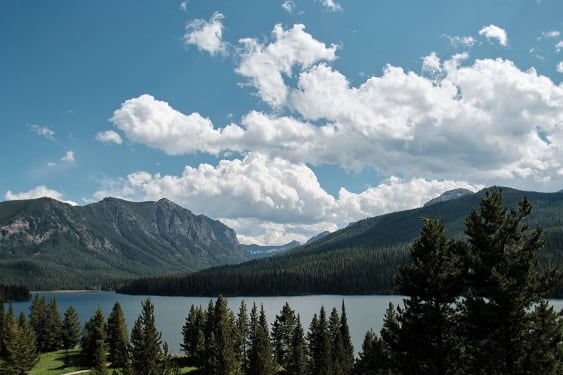
Hyalite Reservoir
Montana is the fourth largest state in the U.S. However, with one of the lowest population densities in the United States, Montana offers a sense of peace, space, and tranquility that continues to draw new residents. The close-knit communities and slower pace of life found in Montana’s small towns and rural areas are also a part of the attraction of the state.
Montana’s history is a tapestry of natural splendor, cultural evolution, and economic development. Its story spans thousands of years, from the presence of Indigenous peoples to its modern identity as Big Sky Country. Given this rich history tied to Native American tribes, ranching, and the Old West, cities like Bozeman are also known for vibrant art scenes, music, and cultural events.
Montana's Native American population is a significant and vibrant part of the state's cultural, historical, and social fabric. Native Americans have lived in the region for thousands of years, and their presence continues to shape Montana today. Native Americans make up about 6% to 7% of Montana’s total population, one of the highest proportions in the United States. The state's Native American population is diverse, representing a range of tribal nations with unique languages, customs, and traditions. This includes 12 tribal nations and seven federally recognized Indian reservations. Tribal nations are key economic drivers in Montana, contributing through businesses, tourism, and natural resource management. Many tribes manage significant natural resources, including land, water, and energy.
While traditionally reliant on agriculture, mining, and forestry, Montana is seeing a growth in tech, tourism, and renewable energy sectors. Montana also plays a central role in the photonics ecosystem particularly through MSU’s Optical Technology Center. Montana is home to a robust cluster of photonics companies, primarily based in the Bozeman area. The photonics industry benefits from Montana’s collaborative spirit with partnerships between companies, academia, and government agencies.
Given the current focus on work/life balance and with increasing flexibility in remote work since the pandemic, many have moved to Montana for its quality of life while maintaining jobs elsewhere. Living in Montana appeals to people seeking a combination of natural beauty, outdoor lifestyle, and a connection to the simpler things in life. Those who love its rugged charm and solitude find it hard to leave. Montana is known for its independent spirit, lifestyle, and the state’s Big Sky Country ethos, reflecting wide-open spaces.
Montana is celebrated for its unique combination of natural, cultural, and lifestyle benefits leading to a significant growth in population and a vibrant economy with growth in industries like tourism, agriculture technology and photonics, and renewable energy. This mix of natural beauty, recreational opportunities, and cultural richness make it a truly special place for those who live there or visit. It’s ideal for individuals seeking adventure, a slower pace of life, or a close connection with nature.
The City of Bozeman, Montana
Bozeman, Montana, is a vibrant and rapidly growing city located in the heart of the Gallatin Valley, surrounded by the stunning Rocky Mountains. Known for its picturesque setting, high quality of life, and strong ties to education, outdoor recreation, and innovation, Bozeman has become one of the most desirable places to live, work, and visit in the United States. The city’s dynamic blend of natural beauty, cultural amenities, and economic opportunity makes it a hub for residents, entrepreneurs, students, and tourists alike.

Downtown Bozeman, Montana
Bozeman's economy has experienced rapid growth in recent years, driven by key industries including technology, tourism, education, agriculture, and healthcare. The city has emerged as a center for tech startups and entrepreneurial ventures, attracting professionals and businesses in fields such as software development, renewable energy, and high-tech manufacturing. Bozeman is home to a growing number of incubators and coworking spaces that support innovation and collaboration among entrepreneurs and creatives.
Bozeman is renowned for its outdoor recreational opportunities. With easy access to world-class skiing, hiking, mountain biking, fishing, and Yellowstone National Park, residents and visitors alike enjoy a lifestyle centered around nature and outdoor adventure. The city is also known for its clean air, low crime rates, and small-town charm, offering a balance of urban amenities and a close-knit community.
Compensation
Salary will be competitive and commensurate with qualifications and experience.
How to Apply
Vice President of Executive Search, Jim Johnsen, & Associate Vice President of Executive Search, Julie Holley, with Greenwood Asher & Associates® are assisting Montana State University with this search. Applications and nominations are now being accepted.
Inquiries, nominations, and application materials should be directed to Greenwood Asher & Associates. Application materials should include:
- A letter of interest that clearly states the applicant’s qualifications for the position
- A current résumé/curriculum vitae
- The name, relationship, and email address of five professional references
We strongly encourage submitting application materials as PDF attachments. The search will be conducted with a commitment of confidentiality for candidates until finalists are selected. Initial screening of applications will begin immediately and will continue until an appointment is made.
Please direct inquiries, nominations, and application materials to:
- Jim Johnsen, Vice President of Executive Search, [email protected]
- Julie Holley, Associate Vice President of Executive Search, [email protected]
Greenwood Asher & Associates
42 Business Centre Drive, Suite 206
Miramar Beach, Florida 32550
850-650-2277
greenwoodsearch.com
In compliance with the Montana Veteran's Employment Preference Act, MSU provides preference in employment to veterans, disabled veterans, and certain eligible relatives of veterans. To claim veteran's preference, please complete the veteran's preference information located in the Demographics section of your profile.
Montana State University does not discriminate against any applicant on the basis of race, color, religion, creed, political ideas, sex, sexual orientation, gender identity or expression, age, marital status, national origin, physical or mental disability, or any other protected class status in violation of any applicable law.
Greenwood Asher & Associates is a Kelly® Education company.
An Equal Opportunity Employer © 2022 Kelly Services, Inc. All rights reserved MT1826
